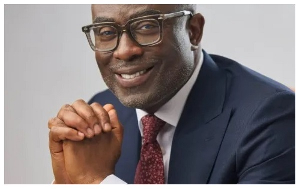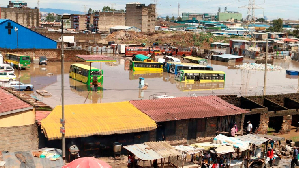- Home - News
- TWI News | TV
- Polls
- Year In Review
- News Archive
- Crime & Punishment
- Politics
- Regional
- Editorial
- Health
- Ghanaians Abroad
- Tabloid
- Africa
- Religion
- Election 2020
- Coronavirus
- News Videos | TV
- Photo Archives
- News Headlines
- Press Release
General News of Thursday, 14 August 2014
Source: Inform Ghana
Poll finds Ghanaians trust state institutions
A fair majority of Ghanaians have trust in state institutions, suffice to say in a period where public skepticism toward state institutions have raised all-time high, according to a poll conducted by the United Nations Development Programmes (UNDP) and the Ghana Center for Democratic Governance (CDD-Ghana.)
The survey, released in July 2014, has demystified long held opinions that trust in state run institutions is low. Trust in institutions in any country is one of the most essential building blocks for a resilient democratic governance structure.
The Governance and Peace poll (GaP Poll), asked respondents the extent to which they trust some 5 selected institutions including the Electoral Commission, National Peace Council, the Judiciary, District Assemblies and the Commission for Human Rights and Administrative Justice (CHRAAJ).
Fifty seven percent (57%) of respondents said they have trust in the Electoral commission while 4 in 10 (41%) said they ‘did not at all’ or ‘just a little’ trust the Electoral Commission. At the regional level, the survey showed that in 6 out of the 10 regions, that is, Volta, Northern, Brong Ahafo, Upper West, Upper East and Central the percentage of respondents who said they trust the electoral commission ‘somewhat’ or ‘ ‘a lot’’ was higher than the national average of 57%.
In terms of trust for the National Peace Council, 64% of respondents reported they trust the National Peace Council, ‘somewhat’ or ‘a lot’. About a quarter (25%), however, reported mistrust for the council. Six (6) out of the ten (10) regions (Upper West, Central, Northern, Volta, Brong Ahafo and Greater Accra) were between 3 and 10 percentage points higher than the national average (64%) for those who reported they ‘somewhat’ or ‘a lot’ trust the National Peace Council.
Also, trust for the law courts overall was consistent across the regions. Specifically, a marginal majority of 53% compared to 42% of the respondents said they trust the law courts ‘somewhat’ or ‘a lot’. The survey results from the regions showed striking variations in the percentage of people who reported trust for the law courts. Trust for the law courts was particularly low among respondents in the Upper West and Upper East regions as compared to the other regions. Trust for the courts was highest in the Northern and Volta regions where more than 6 in 10 reported they trust the courts, ‘somewhat’ or ‘‘a lot’’, to deliver on their mandate.
In contrast, trust for district assemblies was relatively low. In general out of the total number of respondents interviewed, 42% reported they trust their District Assembly ‘somewhat’ or ‘a lot’. A marginal majority (53%) of the respondents, however, did not trust their district assembly ‘at all’ or ‘a little’. In terms of the regional breakdown, the survey revealed that in 5 out of the 10 regions, the percentage of respondents who reported they did not trust their district assembly, ‘at all’ or ‘a 1 little’ was higher than the national average of 53%.
Trust for the district assembly was particularly low in the Western, Central, Greater Accra and Upper West regions where the majority reported they did not trust their district assembly ‘at all’ or ‘a little’. On the contrary, majority of respondents in Northern and Upper East reported they trust their district assemblies ‘somewhat’ or ‘a lot.’
The survey further revealed that aside the National Peace Council, CHRAJ was the most trusted institution among all the institutions surveyed. Out of the total number of respondents surveyed, 6 in 10 (60%) reported they trust the CHRAJ, ‘somewhat’ or ‘a lot’, while a quarter (25%) said they did not trust the CHRAJ ‘at all’ or ‘a little’. Trust for the CHRAJ was particularly high in the Northern and Brong Ahafo regions where more than 7 in 10 reported they trust the CHRAJ ‘somewhat’ or ‘a lot’, and low in the Ashanti Region where less than half indicated they ‘somewhat’ or ‘a lot’ trust the CHRAJ. In all, trust for the CHRAJ in 5 out of the 10 regions was higher than the national average of 60%.
The GaP Poll elicited responses from 938 Ghanaian adults 18 years and above. The methodology applied in conducting the GAP Poll survey was to ensure national representation with a margin of error not higher than 5% at the 95% confidence level.
THE 2014 HUMAN DEVELOPMENT REPORT LAUNCHED IN GHANA
By Inform Ghana
The UNDP’s Human Development Report (HDR) 2014 has officially been launched in Ghana at an event held at the La Palm Royal Beach Hotel.
The launch was done by the chairperson for the occasion, Nana Oye Lithur, the Minister for Gender, Children and Social Protection.
In her speech, the Minister expressed the importance of human development, saying that “economic growth is meaningless unless it is linked up with human development.” She gave examples of the government’s welfare policies and programmes and pointed to the reduction in poverty rates. She indicated that Ghana’s rank of 138 out of 187 countries in terms of the Human Development Index (HDI) was an indication that government needed to work harder.
In a welcome address, Ms Gita Welch, the UNDP Resident Representative said the HDR 2014 seeks to demonstrate that the concept of human development needs to consider human vulnerabilities. She suggested that it is not enough to reduce poverty. More had to be done to ensure that people that have been helped out of poverty do not fall back into it because of personal, environmental or political crisis. She also revealed that the HDR also focuses on inequality. She expressed the gratitude of the UNDP to have been part of the Pan-African Conference on Inequality which was held in Accra in April this year.
Ms Radhika Lal, Economic Advisor to the UNDP, speaking about the report, said it was impossible to talk about human development without issues such as conflict, civil unrest, natural disasters and HIV/AIDS. She pointed out that international interconnectivity was a factor in human vulnerabilities. She cited the example of the spread of Ebola and the global recession that was caused by problems in the US housing market. She said once the HDIs were adjusted for inequality, they did not look impressive. Climate change was another source of vulnerabilities, she said.
Issues of race, gender and religion had an effect on people’s abilities to express themselves, she continued. She highlighted the importance of employment and revealed that the report not only made the case for social protection, but also for full employment. 1.5 billion people around the world are in vulnerable employment, 90% of these people are in the informal sector, she revealed. 60% of Africa’s middle-class, she said, is actually poor. She said they are better referred to as a ‘floating class’ since they can easily fall back into poverty. In conclusion, she said even though expenditure on social protection had increased worldwide, 80% of people still do not have access to comprehensive social protection. She asked for social protection measures to be put in place as Ghana seeks an IMF programme.
Mr Kordzo Sedegah, an Economics specialist with the UNDP, revealed that the methodology for calculating the HDI had been changed. He said Ghana’s HDI was 0.573 which was only marginally higher than the 2012 figure of 0.571. Ghana is ranked at 138 out of 187 countries. Our HDI is lower than the medium figure of 0.614 but higher than the Sub-Saharan average of 0.502. When the HDI is adjusted for inequality, it falls to 0.394, a loss of 31.3%. The average loss due to inequality is 25.6% for medium HDI countries and 33.6% for Sub-Saharan Africa. He revealed that Ghana’s Gender Inequality Index (GII) was 0.549 in 2013, ranking at 122 out of 149 countries.
Professor Jacob Songsore of the Department of Geography & Resource Development at the University of Ghana said that much of the inequality in Ghana was manufactured outside the country. He said inequality was a legacy of colonialism. He blamed the development gap between the Northern and Southern sectors of the country on the use of the North as a reserve for cheap labour by the colonialists.
He revealed that governments over the years have privileged cocoa farming and have punished subsistence farming. He blamed the concentration of elites in urban sectors for the inequality between urban and rural parts of the country. He said the elite were more effective in getting social amenities to their communities. On the issue of gender inequality, he said although there is a traditional patriarchal system, it was exacerbated by the colonialist patriarchal system.
The planning officer for the Wa Municipality, Mr Majeed, shared the experience of his district. He highlighted the challenges they faced and the ways in which the district assembly had tried to improve women’s participation in development.
Opinions









